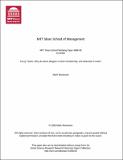Fuzzy Teams: Why do teams disagree on their membership, and what does it mean?
Author(s)
Mortensen, Mark
DownloadSSRN-id1096160.pdf (1.159Mb)
Metadata
Show full item recordAbstract
Organizations increasingly rely on teams as fundamental building blocks - a focus mirrored by a long legacy of research on teams. Due to the complexity of team dynamics and processes within teams
and small groups, to date such research has yielded an ambiguous or equivocal set of results regarding the
determinants of team performance. I suggest that a major confounding factor in such results is the impact
of contextual factors on individual members’ agreement or disagreement as to the membership of those
very teams. The prevalence of such boundary disagreement is likely to continue increasing as more and
more organizations structure their work around project-based teams, characterized by short time horizons
and multiple overlapping contexts which stand to significantly affect individual members’ perceptions
and understanding of those teams.
In this research, I introduce and examine the phenomenon of team boundary disagreement. I
build upon social categorization to provide a framework for the membership attribution process that leads
to team boundary disagreement. In a study of 39 formally-defined, software and product development
teams in a multinational software company, I use surveys and interviews to identify antecedents and
effects of team boundary disagreement. As hypothesized, I find boundary disagreement exists in the
majority (72%) of teams and is predicted by heterogeneity of communication patterns, both level and
heterogeneity of task interdependence, and member uniqueness on task-relevant dimensions. I further find
teams experiencing boundary disagreement perform significantly poorer than those without – a
relationship mediated by shared identity. These findings provide the basis for a discussion of the impacts
of boundary disagreement on our understanding of individual perceptual frameworks, extant theories of
small groups dynamics, and the relationships between different approaches to understanding teams.
Date issued
2008-02-01Publisher
Cambridge, MA; Alfred P. Sloan School of Management, Massachusetts Institute of Technology
Series/Report no.
MIT Sloan School of Management Working Paper;4688-08
Keywords
team dynamics, boundary disagreement